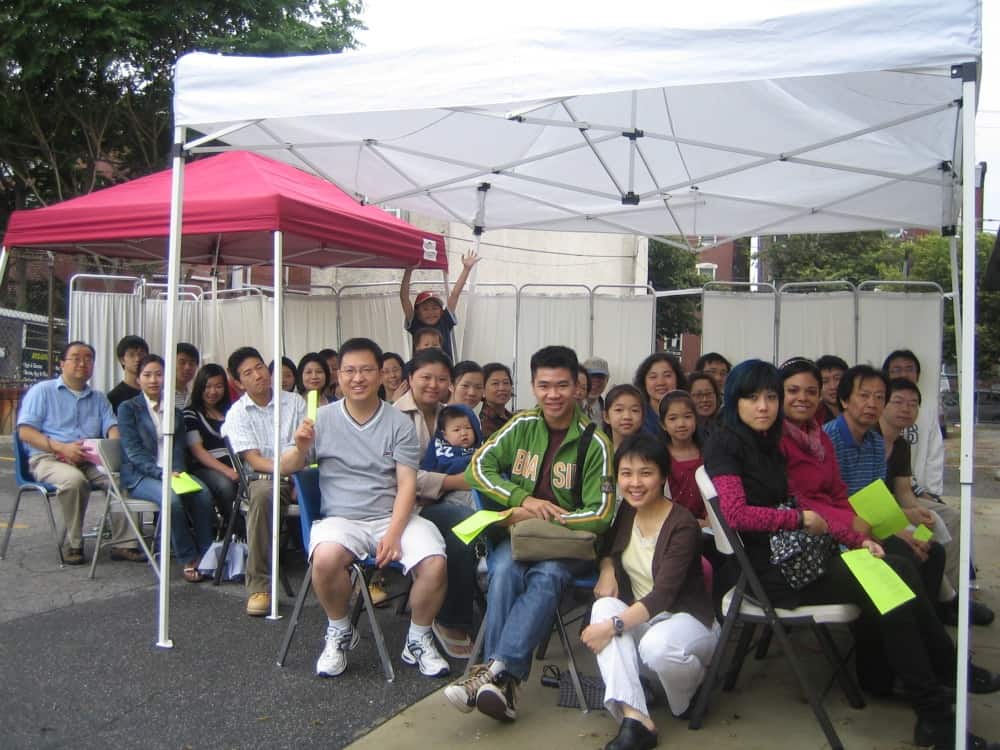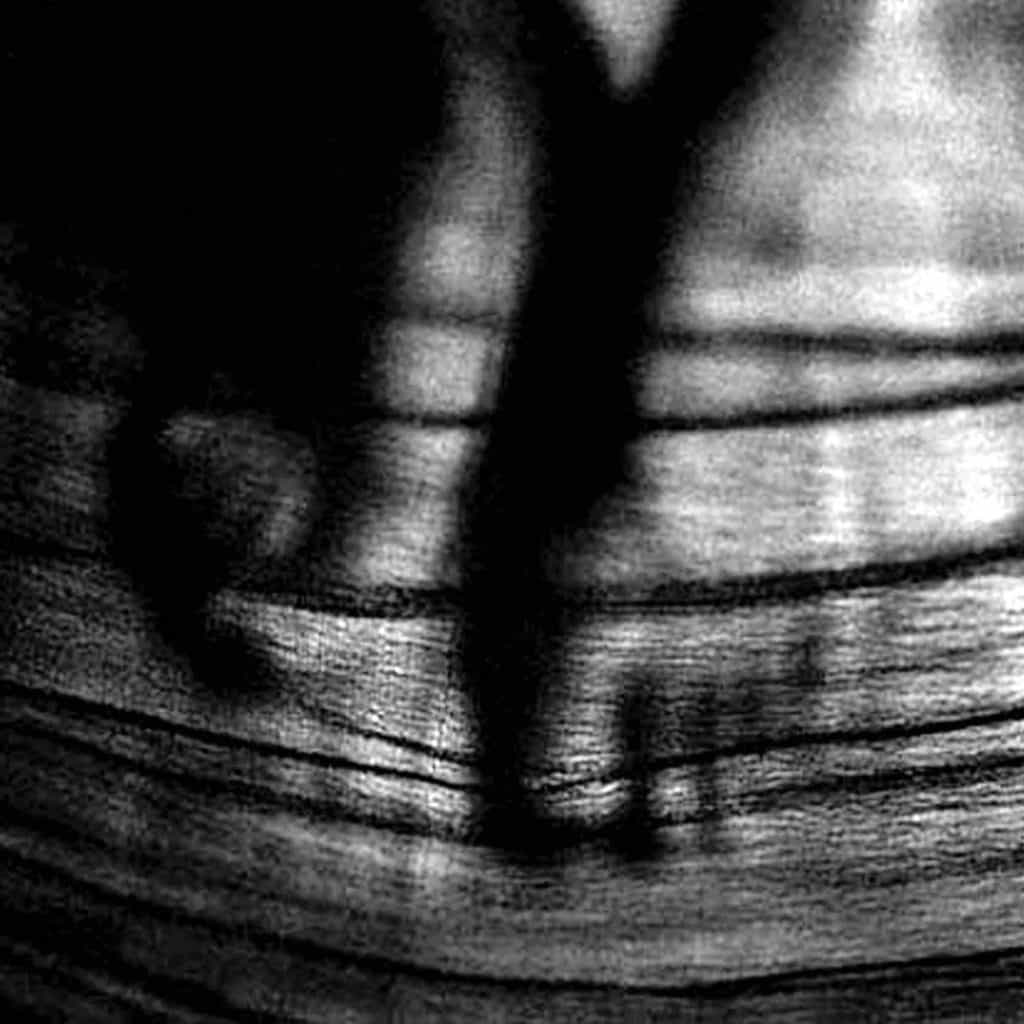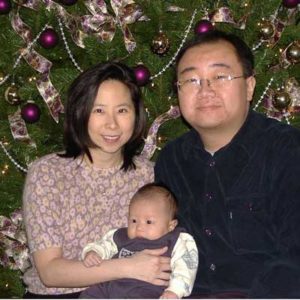Church leaders can become consumed by activities, numbers, and plans. Indeed, such leaders are regularly held up in the professional ministry world as models for the rest to emulate. A church planter in South Philadelphia took a different direction–often against his own wishes–and he shares his journey from activity to inactivity, from busyness to stillness, and from being a Martha to becoming a Mary.
By Kin Lam
Opening Stanza from Choruses from “The Rock,” T. S. Eliot (1888-1965):
The Eagle soars in the summit of Heaven,
The Hunter with his dogs pursues his circuit.
O perpetual revolution of configured stars,
O perpetual recurrence of determined seasons,
O world of spring and autumn, birth and dying.
The endless cycle of idea and action,
Endless invention, endless experiment,
Brings knowledge of motion, but not of stillness;
Knowledge of speech, but not of silence;
Knowledge of words, and ignorance of the Word.
All our knowledge brings us nearer to our ignorance,
All our ignorance brings us nearer to death,
But nearness to death no nearer to GOD.
Where is the Life we have lost in living?
Where is the wisdom we have lost in knowledge?
Where is the knowledge we have lost in information?
The cycles of Heaven in twenty centuries
Bring us farther from GOD and nearer to the Dust.
Church Planting is for Martha
As New City Church celebrates her 5 years of existence in South Philadelphia, I have officially become a “church planting veteran.” And as a veteran, I have, over the years, written countless updates and progress reports. For the vast majority of them, I have followed the “common convention”–of describing activities, recounting stories, reporting numbers, reiterating vision, elaborating on future plans, soliciting prayer requests, and finally requesting financial support. Incidentally, this is what many mission supporters would like to hear. But it did not take me long to realize how little a “conventional progress report” really conveys. Not only do these conventional reports fail to reflect the true condition of a gospel ministry, the very format inevitably leans towards a distortion of the real picture. In the very least, they tend to (falsely) associate growth with numeric increase. In a worse scenario, these reports, dare I say, can be liable to accrediting growth where there is little progress.
Admittedly, a true progress report takes much time and great energy to produce. It takes much time because true progress does not appear overnight. It often takes years before you finally “give in” to the gracious work of God. Think Moses’ 40 years in the wilderness, think also a life-long journey of discipleship with Jesus. It takes great energy because true progress seldom happens without prolonged (and oftentimes intense) wrestling with God. Think Jacob’s overnight wrestling with God in Genesis 32. In the words of Paul Miller, true progress often comes as the result of a “desert experience.” Here are some quotes from Miller’s A Praying Life which echo much of my experience in the past years.
God customizes deserts for each of us… God takes everyone he loves through a desert. It is his cure for our wandering hearts, restlessly searching for a new Eden. Here’s how it works… The first thing that happens is we slowly give up the fight. Our wills are broken by the reality of our circumstances. The things that brought us life gradually die. Our idols die for lack of food… The still, dry air of the desert brings the sense of helplessness that is so crucial to the spirit of prayer. You come face-to-face with your inability… Desert life sanctifies you. You have no idea you are changing. You simply notice after you’ve been in the desert awhile that you are different. Things that used to be important no longer matter… After a while you notice your real thirsts. While in the desert David writes, “O God, you are my God; earnestly I seek you; my soul thirsts for you; my flesh faints for you, as in a dry and weary land where there is no water.” (Psalm 63:1) … The desert becomes a window to the heart of God. He finally gets your attention… 1
At the center of this true progress story is a struggling follower of Christ, i.e. me! And at the heart of this growth process is a gradual spiritual movement from Martha to Mary (cf. Luke 10:38-42). Church planting is (naturally set up) for a Martha. Church planting is activity-intensive, purpose-driven, and goal-oriented. It is a natural trade for the Marthas of this world, and I am one of them! As such, we should not be surprised to see a large number of Marthas attracted to this call. And as much as I would like to think of myself as a balanced individual spiritually, the truth is that I am far closer to the side of Martha than of Mary. The problem of course is that one can only become a good Martha when one is a good Mary. This is true for all Christians in general, but particularly true for Christian ministers, and critically true for church planters.
No wonder I struggled (and still struggle) so badly and fare so poorly as a church planter! But what I would like to share with you is not so much a story about my failure (which is absolutely true and without dispute), but a story of God’s (surprising) grace and (boundless) mercy! This, like all other good stories, is a gospel story, and it is my story.
My name is Kin Lam. I am a failed church planter, pastor of a mini-church, and a struggling follower of Christ.
I am also a beloved child of God. This is my chief, unchanging, and unshakable identity.
Christ Jesus is my Savior–my Prophet, Priest and King. He is my Big Brother. He died and rose again for me and my salvation. He atoned for all my sins, and invited me to claim credits in all of His good and perfect works.
Before the holy God, I am blameless, holy, righteous, and without blemish. I am His and His forever. And since I am eternally secured in Him, I am now free to live for Him, do His will, and boast even of my weaknesses.
‘But he said to me, “My grace is sufficient for you, for my power is made perfect in weakness.” Therefore I will boast all the more gladly of my weaknesses, so that the power of Christ may rest upon me.’ (2Co 12:9)
From Activity to Inactivity; From Busyness to Stillness
The journey began on Sunday, August 7, 2005. It was the first public worship of New City Church in South Philadelphia. It was a multi-ethnic, multi-cultural, multi-lingual affair in celebration of the gospel of Jesus Christ. Many of our ministry partners came to support our inaugural meeting; there were also friends and neighbors from the community. It was a lovely event with close to 100 attendants.

And that remains the largest turnout in our 5-year existence. In fact, it easily doubled our second largest attendance on record, which is somewhere between 40 and 50.
By the end of our first month, our attendance had settled in at around 20-30, and it would stay in that numeric proximity for the years to come. (The fact that we can stay this small and last that long is a miracle by itself.) Nevertheless, back in 2005, New City Church, despite her small size, remained a very active community church, and I was a very busy pastor. Our ESL program was flourishing, and evangelistic events were planned regularly through the year. There were also numerous contacts with community members, and we would soon witness a good number of spiritual new births and baptisms, so much so that half of our congregation would be made up of newly baptized members from the community.
But the true progress had yet to take place, for I remained a busy pastor.
Then things began to change. There were turnovers of leaders / members, and we (as a small and unattractive ministry) were not able to refill those vacant positions with new blood. The ESL program was suspended and later phased out altogether. We moved out of a church building and began worshiping at our house in South Philadelphia. The move brought closeness and intimacy to the young church, but also took away “growth potentials.” By mid-2007, I was on the verge of a burnout. It was the beginning of a “desert experience,” as I often felt lost and confused. By late 2008, I was limping along as a struggling solo pastor. The external activities had slowed down considerably, but the internal restlessness persisted. I was constantly laboring (and feeling frustrated) like a Martha.
The beginning of 2009 brought relief to me and my family as we spent the first three months on a much-needed sabbatical. Back then, a friend asked me, “I thought pastors usually take a sabbatical once every 7 years. How come you are taking a sabbatical after only 3.5 years?” I replied, “I guess I am a weaker pastor than most.” Little did I know that this (being a weak pastor) would be the theme of my personal journey from that point onward. Still, the sabbatical did not go by without stress as we wrestled with the possibility of closing New City versus resuming the work without additional help. It was a very trying time, yet by the grace of God, I was able to respond to His call to return to New City, though I did not know how to move the mission forward given my weakness and exhaustion.
A couple of things began to develop in the second half of 2009. First of all, I was finally “giving up” on New City. I stopped planning for the future, I stopped pondering about strategies, and I stopped praying and dreaming for a breakthrough. I simply lived and ministered day-by-day and week-by-week. Everything beyond the week was unknown to me; I simply focused on the moment, on the particular gospel tasks that were entrusted to me for the time. In the process, I began to turn my sight from New City to the God of New City. When one lives in the midst of such uncertainty, one can only hold on to the invisible hands of God. At last, my chaotic mind was ceasing to labor, a new order was beginning to emerge. Finally, activity was giving way to inactivity. The death of a godless mind was opening a path to the resurrection of a God-conscious existence.
The strong ones are always busy–laboring and achieving for Jesus. But the weak ones have no other choice; they must rest, stay close to Jesus or they would not survive.
Secondly, and personally, I was, slowly but steadily, moving from busyness to stillness. In the summer of 2009, I wrote “Pitch Count [Of Baseball and Ministry]” and later “Learning to Walk Again.” I nicknamed myself “Pastor with a Limp.” All these served to remind myself of my weakness and vulnerability. I was urging myself to slow down and take time to recover. Yet privately, I still harbored hope that someday I would emerge from my weakness and vulnerability, return to “full-strength,” and become a strong and (spiritually) muscular pastor! Little did I know that the secret of becoming like Mary (which was and is still my most desperate need) is in becoming and staying weak. Indeed, only the weak ones could sit still before Jesus. The strong ones are always busy–laboring and achieving for Jesus. But the weak ones have no other choice; they must rest, stay close to Jesus or they would not survive.
During the past year, I have formed a habit of going on an overnight personal retreat once a month. It is a luxury that no busy pastors can afford. And thank God that I was not (and am not) half as busy as the strong and capable ones. It was Eugene Peterson who called pastors to become “unbusy,”2 but it was the smallness and (dare I say) hopelessness of New City that made it possible for me to become and stay “unbusy.” If I have had a choice, I probably would have chosen to be busy over being unbusy. But thank God that I am a weaker brother / pastor among others, and as such I was given a mini-church to pastor! I would not have survived being a busy pastor. I would have passed out, I would have been stressed out, and I would have gone insane (mentally and spiritually). God knows that the only way for me to exercise my pastoral calling is to stay unbusy. What is for the strong a luxury is but for me, the weak one, a life-saving necessity.
My name is Kin Lam. I am a failed church planter, pastor of a mini-church, and a struggling follower of Christ.
I am (fatally) allergic to busyness. I would go insane and die when I become busy. I must stay still. I must stay still for Jesus.
From Urban Mission to Heart Mission; From Kingdom-Centered Prayers to Father-Centered Prayers
I remember watching a very interesting Japanese animation on TV during my teen years in Hong Kong. The story was about a young man training to become a champion boxer. In one memorable episode, he was standing on top of a small hill, waiting for the high-speed trains to pass by. It was a training of supreme concentration. For a long time, he was unable to see any of the subjects inside the train. His eager anticipation for the next train and his earnest desire to master the skills brought no concentration, only distraction.
Then one day, instead of anticipating and running after the trains, he resolved to still his body and calm his heart. He closed his eyes and let his ears detect the nearness of the approaching trains. His body became still and his heart calm. And when he opened his eyes, he was finally able to see, not just the passing trains, but every person and every movement inside the fast-moving trains. Indeed, everything slows down when one’s heart becomes still. It was true for the young boxer, it is also true for the followers of Christ.
I was totally mistaken. God has not called me into urban mission, but to a heart mission.
That is why the story of Martha and Mary in Luke 10:38-42 is so instructive in developing a biblical spirituality. In the past few years, as I slowly moved from activity to inactivity, from busyness to stillness, and from Martha to Mary, new wisdom and insights began to surface. Rather than being buried in my perpetual “problem-solving” mode, pondering how I could get New City “over the hump,” I began taking notice of God’s gracious and persistent work in me. As I read Robert Clinton’s “The Making of a Leader,” it became more and more evident that God was far more interested in me than my ministry (New City).
The amazing thing is that during [the initial phases of leadership development] God is primarily working in the leader (not through him or her). Though there may be fruitfulness in ministry, the major work is that which God is doing to and in the leader, not through him or her. Most emerging leaders don’t recognize this. They evaluate productivity, activities, fruitfulness, etc. But God is quietly, often in unusual ways, trying to get the leader to see that one ministers out of what one is. God is concerned with what we are. We want to learn a thousand things because there is so much to learn and do. But He will teach us one thing, perhaps in a thousand ways: “I am forming Christ in you.” It is this that will give power to your ministry. [The latter phases] will have this “you-minister-from-what-you-are” emphasis.3
Now, before you jump to the (mistaken) conclusion that I am aspiring to be some “up-and-coming leader” of the Christian church, let me assure you that I have neither the ambition nor the gifts and talents to be one. What struck me (and stuck with me) from the above quote is the one sweet and charming phrase: “I am forming Christ in you.” That is what our heavenly Father is doing to me! And in this I will rest! What more can I ask for? What more need I want? Through all the sweat and tears, through all the toiling days and sleepless nights, my Father in heaven is lovingly forming Christ–the likeness of my beloved Big Brother–in me! What a glorious vision!
I was totally mistaken. God has not called me into urban mission, but to a heart mission. He is forming Christ in me. He is my heavenly Father and I am His child. This is my chief, unchanging, and unshakable identity. He is not my CEO, to whom I must report my ministry progress. No, He is my Father who loves me and gave His Son to me. And He desires to see me grow as a son, not as a business associate, and not even as a ministry leader.
In recent months, I have been leading a Bible Study on the Lord’s Prayer. As I prepared and reviewed my notes, I recalled times in the past when I took part in “prayer training” as part of my church planting preparation. Through many lectures and discussion sessions, we came to understand the Lord’s Prayer as a kingdom-centered prayer. To pray the Lord’s Prayer is in essence praying for God’s kingdom to come (to a particular community, area, or city). The Lord’s Prayer is therefore an ideal prayer for the church planter. This is all sound and good, except that it also gives rise to a new problem.
As I have mentioned in the previous section, church planting is a natural trade for the Marthas of this world. The problem is not so much with the Lord’s Prayer itself, but with the Marthas who are eager to apply the Lord’s Prayer in their particular (church planting) setting. It is therefore not uncommon for a church planting Martha to “hijack” the Lord’s Prayer and make it his own. (I, for one, was guilty of this in numerous ways!) Not only does the Lord’s Prayer become an empowering tool for the action-seeking, result-thirsting Martha, even more tragically, the sweet and charming gospel tune of “I am forming Christ in you” is also lost along the way.
While the Lord’s Prayer is indeed a kingdom-centered prayer, it is first and foremost a prayer that centers on our Father’s kingdom. Indeed, the loving fatherhood of God must come before His majestic kingship, as indicated by the opening address: Our Father in Heaven. Consequently, as we move from Martha to Mary, it is imperative that our prayers also move from kingdom-centered prayers to Father-centered prayers. It is only when we become attuned to the sweet heavenly rhyme of “I am forming Christ in you” that we are at last ready to serve our majestic king and His kingdom.
My name is Kin Lam. I am a failed church planter, pastor of a mini-church, and a struggling follower of Christ.
I am also a beloved child of God. This is my chief, unchanging, and unshakable identity.
From Certainty to Uncertainty; From Grown-ups to Children
Out of my many favorite quotes from Dietrich Bonhoeffer’s The Cost of Discipleship, one repeatedly spoke to me during my own “wilderness experience.” It is Luther’s coming to know the mysterious way of God.
Discipleship is not limited to what you can comprehend–it must transcend all comprehension… Not to know where you are going is the true knowledge. My comprehension transcends yours. Thus Abraham went forth from his father… not knowing whither he went… Behold, that is the way of the cross. You cannot find it yourself, so you must let Me lead you as though you were a blind man. Wherefore it is not you, no man… but I Myself, who instruct you by My Word and Spirit in the way you should go. Not the work which you choose, not the suffering you devise, but the road which is clean contrary to all you choose or contrive or desire–that is the road you must take. To that I call you and in that you must be My disciple.4
“You must let Me lead you as though you were a blind man.” Those are harsh and difficult words for anyone who cherishes security and certainty in life. And those were very harsh and difficult words for me. Yet, this is exactly what the Christian life is all about. No wonder Mark makes the blind Bartimaeus (Mark 10:46) the true hero of his gospel! The Christian life is all about following Jesus as “a blind man”–not a hypothetical (and sometimes hypocritical) blind man who asks, “Lord, would You please reveal to me Your will for my life?” but a truly desperate and absolutely dependent blind man who cries, “Lord, please do not let go of me for I know not where to go and how to get there without You!”
Do you see the difference between the two? This is another place where the biblical journey of faith clashes head on with the common notion of “vision” in the (professional) Christian ministry. “What is the vision of your church? Where are you going?” The funny thing is that a few years ago, I could go on and on about the vision of New City, but if I were asked the same question today, I can only respond with a blank face, shrug my shoulders and say, “I don’t really know.” Yet in a strange and profound way, in the words of Luther, “Not to know where you are going is the true knowledge.”
Now, I am by no means suggesting that one should not take time to ponder about vision when one is planting a new church or shepherding an existing one. What I am concerned about (just as what I have discovered in my own experience) is our (my own) reluctance and inability to enter into the reverse gear in our (my personal) journey of faith. Contrary to common understanding, the Christian growth (unlike the physical growth) is, at least in its appearance, a growth in the reverse order.
“[Jesus] said to them, ‘Let the children come to me; do not hinder them, for to such belongs the kingdom of God.’” (Mark 10:14) ‘Truly, I say to you, whoever does not receive the kingdom of God like a child shall not enter it.’ (Mark 10:15)
In exact opposite to physical growth, true spiritual growth is not to be reflected in one’s growing independence, but in one’s growing dependence–to become more like a child.
What makes the children ideal candidates for the kingdom of God? It is neither their innocence nor their child-like faith to trust and obey. Parents should know well that children are not innocent, neither are they by nature trusting and obedient. Rather it is because of their worthlessness and absolute dependence that they become qualified for God’s kingdom! In the same way, it is by grace that we have been brought into the kingdom (for we are all worthless), and into this grace we must keep growing. However, in exact opposite to physical growth, true spiritual growth is not to be reflected in one’s growing independence, but in one’s growing dependence–to become more like a child.
The Christian journey therefore is not be characterized by “growing up,” but by “growing young”!
It is a movement in the reverse direction–from grown-ups to children–from strength to weakness, from ability to inability, from certainty to uncertainty, from knowing to not knowing, from leading to following, from independence to dependence, from ministry to being ministered, and from power to brokenness. The surprising end of all these however is but a movement from restlessness to contentment, from weariness to rest, from constant anxiety to enduring trust–from seeking from Him the “map of my life” to holding His hands and abiding in His presence. This is at last a movement from Martha to Mary.
My name is Kin Lam. I am a failed church planter, pastor of a mini-church, and a struggling follower of Christ.
I am also a beloved child of God. And I am growing in the “reverse direction.” I am “growing young” with Jesus.
Notes
1 Paul E. Miller, A Praying Life: Connecting with God in a Distracting World (Colorado Springs, CO: NavPress, 2009), 184-185.
2 Eugene H. Peterson, The Contemplative Pastor: Returning to the Art of Spiritual Direction (Grand Rapids, MI: Eerdmans, 1993), 17-25.
3 J. Robert Clinton, The Making of a Leader (Colorado Springs, CO: NavPress, 1988), 32.
4 Dietrich Bonhoeffer, The Cost of Discipleship (New York, NY: Touchstone, 1995), 93.




4 thoughts on “From Martha to Mary: A Church Planter’s Spiritual Journey”
Thank you, brother, for telling your story. Too many leaders experience a similar journey but remain crippled by the shame rather than embracing their weakness. I’m sure this article will be a blessing to so many. Thank you for learning to sit at the Master’s feet and sharing the journey.
Brother–Thank you for this. I continue to hold you up in prayer.
What a brilliant article, and one that took a lot of guts to write. Reminds me of what Darrell Johnson writes in the Glory of Preaching – he says that God’s favourite word is ‘Come’. Yes, Jesus says Go, Give, Serve etc… but his favourite word is Come. I’m suddenly very uneasy about the results-oriented ministry of which I am part. There are so many good programmes, but maybe God gets side-lined. The irony of it all. Thanks Kin.
This article by Kin Lam spoke to me in so many ways. I appreciate how Kin kept personalizing his “theories” and thoughts so as not to alienate someone whom God is using to raise up a “bigger” work. But I am there with Kin. I too need to learn and relearn to be still before the Lord and measure my success by my relationship with my Lord and Savior. Thank you Kin for writing this wonderful article. Thank you Kyu for editing it and thank you Ben for referring it to me! We are all brothers heading in the “reverse” direction – Amen!